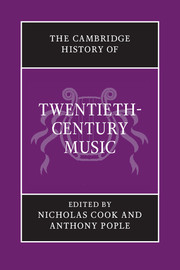Book contents
- Frontmatter
- Introduction: trajectories of twentieth-century music
- 1 Peripheries and interfaces: the Western impact on other music
- 2 Music of a century: museum culture and the politics of subsidy
- 3 Innovation and the avant-garde, 1900–20
- 4 Music, text and stage: the tradition of bourgeois tonality to the Second World War
- 5 Classic jazz to 1945
- 6 Flirting with the vernacular: America in Europe, 1900–45
- 7 Between the wars: traditions, modernisms, and the ‘little people from the suburbs’
- 8 Brave new worlds: experimentalism between the wars
- 9 Proclaiming the mainstream: Schoenberg, Berg, and Webern
- 10 Rewriting the past: classicisms of the inter-war period
- 11 Music of seriousness and commitment: the 1930s and beyond
- 12 Other mainstreams: light music and easy listening, 1920–70
- 13 New beginnings: the international avant-garde, 1945–62
- 14 Individualism and accessibility: the moderate mainstream, 1945–75
- 15 After swing: modern jazz and its impact
- 16 Music of the youth revolution: rock through the 1960s
- 17 Expanding horizons: the international avant-garde, 1962–75
- 18 To the millennium: music as twentieth-century commodity
- 19 Ageing of the new: the museum of musical modernism
- 20 (Post-)minimalisms 1970–2000: the search for a new mainstream
- 21 History and class consciousness: pop music towards 2000
- 22 ‘Art’ music in a cross-cultural context: the case of Africa
- Appendix 1 Personalia
- Appendix 2 Chronology
- Index
- References
22 - ‘Art’ music in a cross-cultural context: the case of Africa
Published online by Cambridge University Press: 28 March 2008
- Frontmatter
- Introduction: trajectories of twentieth-century music
- 1 Peripheries and interfaces: the Western impact on other music
- 2 Music of a century: museum culture and the politics of subsidy
- 3 Innovation and the avant-garde, 1900–20
- 4 Music, text and stage: the tradition of bourgeois tonality to the Second World War
- 5 Classic jazz to 1945
- 6 Flirting with the vernacular: America in Europe, 1900–45
- 7 Between the wars: traditions, modernisms, and the ‘little people from the suburbs’
- 8 Brave new worlds: experimentalism between the wars
- 9 Proclaiming the mainstream: Schoenberg, Berg, and Webern
- 10 Rewriting the past: classicisms of the inter-war period
- 11 Music of seriousness and commitment: the 1930s and beyond
- 12 Other mainstreams: light music and easy listening, 1920–70
- 13 New beginnings: the international avant-garde, 1945–62
- 14 Individualism and accessibility: the moderate mainstream, 1945–75
- 15 After swing: modern jazz and its impact
- 16 Music of the youth revolution: rock through the 1960s
- 17 Expanding horizons: the international avant-garde, 1962–75
- 18 To the millennium: music as twentieth-century commodity
- 19 Ageing of the new: the museum of musical modernism
- 20 (Post-)minimalisms 1970–2000: the search for a new mainstream
- 21 History and class consciousness: pop music towards 2000
- 22 ‘Art’ music in a cross-cultural context: the case of Africa
- Appendix 1 Personalia
- Appendix 2 Chronology
- Index
- References
Summary
The artistic challenge, one I accept, is to use the tools of Western progress and communicate messages of African heritage.
Francis BebeyThe artistic challenge, one I accept, is to use the tools of Western progress and communicate messages of African heritage.
Francis Bebey(Re)constructing African music
In the interconnected global ethnoscape of the late-twentieth century, the aesthetics of ‘art’ and popular music alike increasingly bore the mark of hybridity and cultural crossover. It is a world in which once-secure musical boundaries became highly porous; in which transnational cultural exchanges produced an array of richly intersecting multicultural musical forms; indeed, a world in which ‘polystylism’ was itself considered a representative hallmark of a post-modern condition that challenged the very concepts of cultural authenticity and artistic originality. Collaborative avant-garde projects, like that between Philip Glass and the West African griot Foday Musa Suso, resulted in music that smoothly overlays discrete musical styles, in this case Glass’s distinctively minimalist additive rhythms (already indebted to Indian classical music) with the cyclic patterning of the kora. Elsewhere, European composers with minimalist leanings, like György Ligeti, extended the dense textures created by Central African polyphonic techniques by drawing out acoustically produced ‘inherent rhythms’ in the context of Western musical instruments. Relatedly, American postmodernists, like Mikel Rouse, wrote operas (such as Failing Kansas (1995) and Dennis Cleveland (1996)) that sound like creative transcriptions of the African rhythmic processes found in A. M. Jones’s Studies in African Music.
- Type
- Chapter
- Information
- The Cambridge History of Twentieth-Century Music , pp. 584 - 614Publisher: Cambridge University PressPrint publication year: 2004
References
- 5
- Cited by



